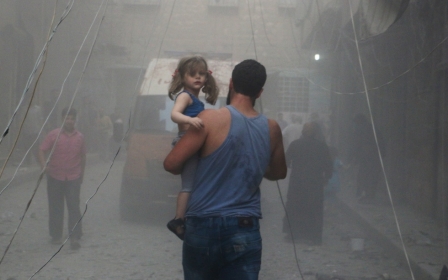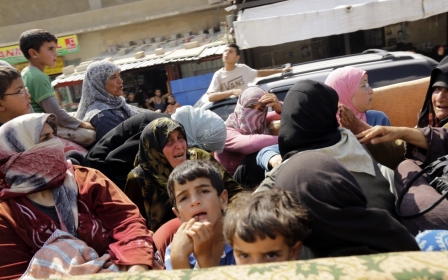Syrian refugees in Turkey face increasing hardships

Since the beginning of the conflict in Syria, Turkey has been the largest recipient of refugees in the region after Lebanon. With its 911 kilometers-long and easily-passable border with Syria, Turkey opened its doors to the influx of the people who were caught in the midst of Bashar al-Assad and opposition forces' crossfire.
Though Turkey's open door policy has been a very welcoming move in the eyes of the international community, the difficulties of dealing with almost 1 million refugees is now a challenging task for the Turkish government.
The Disaster and Emergency Management Presidency of Turkey, known as AFAD, established tent, and later container towns, to handle the humanitarian crisis. The government's efforts met international praise as these settlements did not only provide shelter, but also answered to the needs of daily life including access to education, health and entertainment.
According to the AFAD figures, more than 200,000 people are currently living in camps that are established in cities near the border. However, an estimated 800,000 refugees are scattered in border towns or larger cities. Additionally, the official figures say that more than 200,000 people returned to Syria.
The platform to monitor Syrian refugees in Istanbul, a joint initiative of NGOs and universities, which conducts field studies, state that the Syrian refugees who allegedly returned are actually still in Turkey; and findings suggest that this group is becoming larger every day. Some are fortunate enough to fulfill their basic needs, but most of them live in dire conditions.
Over the past few months, the presence of Syrians who do not prefer living in camps and have opted for cities, came to the fore after a series of assaults. During this summer alone, cities like Kahramanmaras, Gaziantep and Adana near the Syrian border witnessed widespread anger and violent protests against refugees.
In August, the killing of a Turkish landlord by a Syrian tenant sparked more violence in Gaziantep. After the incident, hundreds of Syrians left the city to live in the camps nearby.
The danger of violence is also imminent in larger cities. As Syrian refugees have become more prominent, the governor of Istanbul felt the need to make a statement earlier in July. When asked at a press conference, Huseyin Avni Mutlu said that currently 67,000 Syrians are residing in Istanbul, highlighting that they are mostly middle-class families. Furthermore, he added that refugees begging for money are a serious concern, and that the governorate is working to solve the problem. He concluded, "Even other [resident] Syrians are uncomfortable with the current situation. [This beggar image] affects all Syrians in a negative way."
Shortly after, the Istanbul governorate ordered a comprehensive "clean-up" of tent and makeshift shelters, which Syrian refugees built in open areas in Istanbul.
"Guests," but not refugees
Since the first influx of Syrians in 2011, Syrian refugees in Turkey are officially considered "guests" by the Turkish government and not "refugees." The 1951 Geneva Convention relating to the status of refugees outlines the rights of individuals who take refuge in third countries. Turkey signed the agreement with a "geographical limitation;" it only accepts refugees from Europe, and does not grant refugee status to nationals from other countries.
This status given by Turkey does not fall into any category under international conventions. In April 2012, the "guest" status was changed to "temporary protection" with a governmental decree, but the contents of this decree have never been publicly available.
According to Suna Gulfer Ihlamur-Oner, a professor focusing on trans-national migration studies at Marmara University, the "guest" status is the root of the current problem. As only one-fifth of Syrians are living in camps, and none of them have been granted the full rights that "refugees" enjoy, the majority are struggling to survive in the big cities and facing serious hardship.
"The main issue here is that we cannot develop a comprehensive strategy to deal with the ongoing crisis because of this 'guest' status," Ihlamur-Oner told MEE. "The refugee situation is worsening and new challenges appear."
"The presence of Syrians outside the camps affects so many cities," she said. "Now they have an impact on the socio-economic structure and daily lives of Turks."
The lack of transparency regarding the status of the Syrian refugees and the legal framework to deal with them bring arbitrary practices. These practices do not only occur on the governmental level, but they consist of many recurring problems in their daily lives.
From limited access to healthcare services, to the lack of educational facilities, and even problems with registration of newborns create a huge sense of insecurity among Syrian refugees. This insecurity and lack of protection is a constant force, urging them to return to Syria once the conflict is over.
Ahmet Icduygu at Koc University stated that the term "guests" generates a feeling of relief for politicians, as well as for citizens of the host country. However, as the Syrian quagmire prolongs, and the confidence in the opposition forces gradually drops, the situation becomes a heavy burden on the shoulders of Syrians refugees.
Besides, the option to return to the camps is also very limited. Though Turkey's open door policy is still in place, the camps have met their maximum capacity and admission of newcomers is not feasible. This situation either leads Syrians to form their own tent towns on the Syrian side of the border, or directly travel to Turkish cities.
Moreover, lack of coordination between state institutions and NGOs gravely hampers access to humanitarian aid. "Considering the fact that camps are already full and refugees keep coming every day, the situation is not going to change for the better," said Ihlamur-Oner. For her, under these circumstances, the temporary protection method would not serve anything, and Turkey urgently needs to change this policy.
As Syrians outside the camps cannot enjoy the facilities that are provided within camp premises, they develop different means to deal with difficult conditions. Multiple families co-habitat in the same living quarters, sometimes with even more than 3 families sharing an apartment that is designated to accommodate one family with two children. In larger cities, damp places that lack access to clean water and proper heating are being let as apartments.
In order to survive, Syrians seek employment in low qualified jobs all around the country. In most cases, a Syrian refugee shows willingness to accept a daily wage of one third of an ordinary Turkish worker. As the living conditions become harsher, more Syrians are lowering their "standards," simultaneously creating hostility in local communities.
According to Ihlamur-Oner, the government needs to find new ways to deal with the upcoming humanitarian disaster, especially because it is potentially the second crisis that this group could experience. Existing obstacles that impede contributions by international institutions should be removed, and new mechanisms for coordination should be developed.
She said, "For the purpose of readiness for potential refugee crises in the future, Turkey must come up with a human rights oriented refugee regime for the existing and future incidents, and must not focus on temporary solutions. These temporary solutions negatively affect the public order and societal peace."
Hostile communities
"The reactions [against the Syrian refugees] are not different than the anti-immigration discourse that has been on the rise, and is mostly reflected by the radical right parties in Europe," said Umut Ozkirimli, a professor focusing on nationalism studies at Lund University. "First of all, we all have to categorically object and condemn the assaults against the Syrians," he told MEE.
He further argued that condemning is not enough, and this is not a problem that can be tackled on a societal level, with newspaper columns or social media campaigns. "Ultimately, Syrian refugees are trying to make a living while dealing with discrimination every day; and it is quite natural that they are willing to work in jobs that pay less than usual," he said.
Syrians willing to pay higher rents, but also earning less or doing tax-free business, seem to be the apparent underlying cause of the problem. However, the absence of state protection, directly or indirectly, affects the lives of the Syrian refugees as well as the lives of the communities with which they interact.
"It is obvious that the political conjuncture and demographics trigger inter-societal hostilities with different facets," Ihlamur-Oner argued. For her, the ethnic/sectarian tensions in Hatay, street assaults in Kahramanmaras, the battering of Syrian shops in Adana and social media protest campaigns in Gaziantep represent cumulative anger against the refugees.
"On the top of that, some media outlets are not helpful either," she told MEE. "The way that they present the current situation, combined with a negative attitude, but also backed by unverified information, makes the lives of the refugees even more miserable," she said.
Indeed, false reports, such as the employment of Syrians in the Soma coal mine when the accident took place (May 2014), and that Syrian refugees were granted citizenship in return for voting for the Justice and Development Party in the last local elections, fed existing prejudices against Syrians.
"The most important step is to inform the public well and take concrete steps to help Syrians integrate into Turkish society," Ihlamur-Oner said. "The ministry of labor's efforts to grant them working permits or works on the recognition of Syrian diplomas are welcoming moves to prevent the current exploitation and hardship, but no progress has been made so far."
Therefore, it is again in the hands of the government to reduce the tensions with more regulation. According to Ozkirimli. "Opening the border is one humanitarian duty, but it is not enough. The government should create jobs for Syrians, meanwhile easing the hostilities."
For Ozkirimli, no matter what the cause is, the increasing number of violent incidents simply cannot be explained as unique cases. "Turkey has always been like this. Xenophobia and a lynching culture are so inherent to Turkish history, but no one admits it," he said. "Not only the current government, but previous administrations have always came up with excuses, trying to cover up problems alike."
"The republican period is full of similar mass lynching examples. Overlooking this reality is nothing but inviting another disaster," Ozkirimli concluded.
Stay informed with MEE's newsletters
Sign up to get the latest alerts, insights and analysis, starting with Turkey Unpacked
Middle East Eye delivers independent and unrivalled coverage and analysis of the Middle East, North Africa and beyond. To learn more about republishing this content and the associated fees, please fill out this form. More about MEE can be found here.




